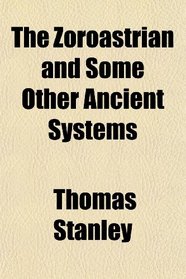Search -
The Zoroastrian and Some Other Ancient Systems
The Zoroastrian and Some Other Ancient Systems
Author:
General Books publication date: 2009 Original publication date: 1886 Original Publisher: Indian Printing Press Subjects: Theosophy Religion / Theosophy Religion / Zoroastrianism Notes: This is a black and white OCR reprint of the original. It has no illustrations and there may be typos or missing text. When you buy the General Books e... more »
Author:
General Books publication date: 2009 Original publication date: 1886 Original Publisher: Indian Printing Press Subjects: Theosophy Religion / Theosophy Religion / Zoroastrianism Notes: This is a black and white OCR reprint of the original. It has no illustrations and there may be typos or missing text. When you buy the General Books e... more »
ISBN-13: 9781150307164
ISBN-10: 1150307161
Publication Date: 12/19/2009
Pages: 200
Rating: ?
ISBN-10: 1150307161
Publication Date: 12/19/2009
Pages: 200
Rating: ?
0 stars, based on 0 rating




